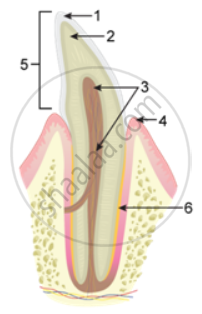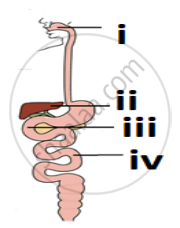Advertisements
Advertisements
Question
What is the role of saliva in the digestion of food?
Solution
The role of saliva in the digestion of food:
- It moistens the food for easy swallowing.
- It contains a digestive enzyme called salivary amylase, which breaks down starch into sugar.
APPEARS IN
RELATED QUESTIONS
Which of the organs perform the functions in humans Absorption of food?
Which of the following are the correct functions of two components of pancreatic juice trypsin and lipase?
(a) trypsin digests proteins and lipase carbohydrates
(b) trypsin digests emulsified fats and lipase proteins
(c) trypsin digests starch and lipase fats
(d) trypsin digests proteins and lipase emulsified fats
The partially digested food coming from the stomach of a person enters a long and narrow organ A in his body. The organ A receives the secretion of two glands : liver and pancreas. Liver secretes a greenish-yellow liquid B which is normally stored in the organ C. Pancreas secretes pancreatic juice which contains three digestive enzymes D, E and F. The intestinal juice completes the process of digestion of food. The inner wall of organ A has millions of tiny finger-like projections G which help in the rapid absorption of digested food into blood stream. The undigested part of food then passes into wider tube H which absorbs most of the water from undigested food. The last part of tube H called I stores this undigested food (or waste) for some time. The undigested food is then passed out though opening J as faeces in the process known as K.
(a) Name the organ A.
(b) Name (i) liquid B, and (ii) organ C.
(c) What are the digestive enzymes D, E and F?
(d) Name the projections G present on the inner wall of organ A.
(e) Name (i) tube H (ii) part I (iii) opening J, and (iv) process K.
Define the terms 'nutrients'.
Study the diagram given below and then answer the question that follows:

Identify the tooth and give a reason to support your answer.
Write true or false for the below statement. Rewrite the false statements correctly.
The pancreas secretes bile juice
Correct the spellings: Pespin
What bodily needs or sensations do you become aware of even though you are reading a book?
Use your brain power!
Why do we sometimes choke suddenly while eating?
Write down the explanation.
Explain why human dentition is considered as thecodont, diphydont and heterodont.
Identify the salivary gland lying below the tongue.
The coiled middle portion of the small intestine which is 2.5 meters long is the ______.
In the given histology of the alimentary canal, identify i, ii, and iii.

Observe the diagram of Human digestive system.

Match the labeling referred in column I and correlate with the function in column II.
| Column I | Column II | |
| i. | a. | The length of this depends on food the organism eats. |
| ii. | b. | Initial phase of starch digestion |
| iii. | c. | Increase the efficiency of lipase enzyme action |
| iv. | d. | This is the site of the complete digestion of carbohydrates, proteins and fats. |
Why do we eat?
List the parts of the digestive system.
Curdling of milk protein is done by ______.
What are villi?
In which layer of the wall of alimentary canal, secretary glands are present?
Write the chemical name and Molecular formula of tooth enamel.
